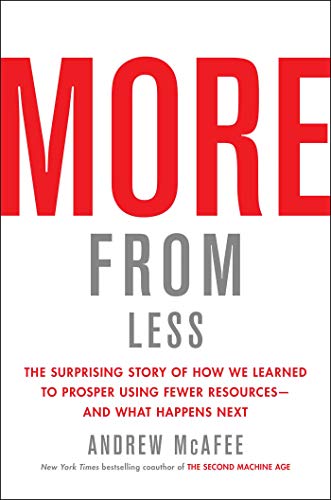More from LessThe Surprising Story of How We Learned to Prosper Using Fewer Resources and What Happens Next
|

|
 Diese Seite wurde seit 1 Jahr inhaltlich nicht mehr aktualisiert.
Unter Umständen ist sie nicht mehr aktuell.
Diese Seite wurde seit 1 Jahr inhaltlich nicht mehr aktualisiert.
Unter Umständen ist sie nicht mehr aktuell.
 Zusammenfassungen
Zusammenfassungen
 This book shows that we’ve started getting more from less and tells how we reached this critical milestone. The strangest aspect of the story is that we didn’t make many radical course changes to eliminate the trade-off between human prosperity and planetary health. Instead, we just got a lot better at doing the things we’d already been doing.
This book shows that we’ve started getting more from less and tells how we reached this critical milestone. The strangest aspect of the story is that we didn’t make many radical course changes to eliminate the trade-off between human prosperity and planetary health. Instead, we just got a lot better at doing the things we’d already been doing. Throughout history, the only way for humanity to grow was by degrading the Earth: chopping down forests, fouling the air and water, and endlessly digging out resources. Since the first Earth Day in 1970, the reigning argument has been that taking better care of the planet means radically changing course: reducing our consumption, tightening our belts, learning to share and reuse, restraining growth. Is that argument correct?
Throughout history, the only way for humanity to grow was by degrading the Earth: chopping down forests, fouling the air and water, and endlessly digging out resources. Since the first Earth Day in 1970, the reigning argument has been that taking better care of the planet means radically changing course: reducing our consumption, tightening our belts, learning to share and reuse, restraining growth. Is that argument correct?
Absolutely not. In More from Less, McAfee argues that to solve our ecological problems we don’t need to make radical changes. Instead, we need to do more of what we’re already doing: growing technologically sophisticated market-based economies around the world.
How can he possibly make this claim? Because of the evidence. America—a large, high-tech country that accounts for about 25% of the global economy—is now generally using less of most resources year after year, even as its economy and population continue to grow. What’s more, the US is polluting the air and water less, emitting fewer greenhouse gases, and replenishing endangered animal populations. And, as McAfee shows, America is not alone. Other countries are also transforming themselves in fundamental ways.
What has made this turnabout possible? One thing, primarily: the collaboration between technology and capitalism, although good governance and public awareness have also been critical. McAfee does warn of issues that haven’t been solved, like global warming, overfishing, and communities left behind as capitalism and tech progress race forward. But overall, More from Less is a revelatory, paradigm-shifting account of how we’ve stumbled into an unexpectedly better balance with nature—one that holds out the promise of more abundant and greener centuries ahead.
 Dieses Buch erwähnt ...
Dieses Buch erwähnt ...
 Begriffe KB IB clear | AlphaFold
,  Computer Computer computer
, computer
,  Digitalisierung
, Digitalisierung
,  Internet Internet internet
, internet
,  Kapitalismus
, Kapitalismus
,  rebound effect / Jevons' paradox
, rebound effect / Jevons' paradox
,  Technologie Technologie technology
, Wirtschafteconomy technology
, Wirtschafteconomy
|
 Dieses Buch erwähnt vermutlich nicht ...
Dieses Buch erwähnt vermutlich nicht ... 
 Nicht erwähnte Begriffe | Schule |
 Tagcloud
Tagcloud
 Zitationsgraph
Zitationsgraph
 Zitationsgraph (Beta-Test mit vis.js)
Zitationsgraph (Beta-Test mit vis.js)
 2 Erwähnungen
2 Erwähnungen 
- Interview mit einem Optimisten (Andrew McAfee, Hannes Grassegger) (2020)


- COVID-19: The Great Reset (Klaus Schwab, Thierry Malleret) (2020)


 Volltext dieses Dokuments
Volltext dieses Dokuments
 Bibliographisches
Bibliographisches 
 Beat und dieses Buch
Beat und dieses Buch
Beat hat dieses Buch während seiner Zeit am Institut für Medien und Schule (IMS) ins Biblionetz aufgenommen. Beat besitzt kein physisches, aber ein digitales Exemplar. (das er aber aus Urheberrechtsgründen nicht einfach weitergeben darf). Aufgrund der wenigen Einträge im Biblionetz scheint er es nicht wirklich gelesen zu haben. Es gibt bisher auch nur wenige Objekte im Biblionetz, die dieses Werk zitieren.














 Biblionetz-History
Biblionetz-History